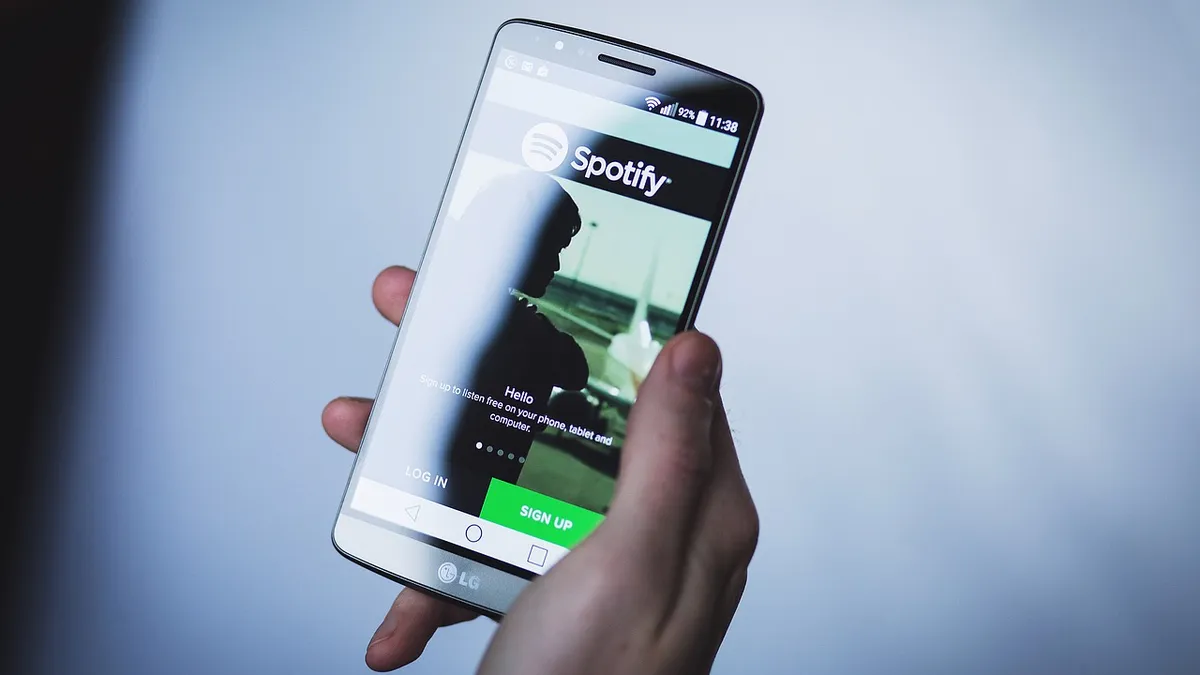Brief:
- Spotify reported a surprise profit as the streaming giant's ad revenue rose 29% to $189 million in Q3 from a year earlier. Listeners of its ad-supported service grew by 29% to 141 million people, while paid subscriptions climbed 31% to 113 million, per an announcement.
- The ad revenue missed internal goals after switching from Google's DoubleClick Sales Manager, which was sunset in July, to new order management software dampened ad sales by about $10 million, per the announcement. Programmatic ad growth slid to 48% in Q3 from a year earlier, compared with 65% in Q2. Spotify typically sells out 99.5% of its ad inventory, but that percentage is now at 97.5% because of lost orders and under-delivery of ads, CFO Barry McCarthy said in a conference call with analysts. The delivery rates are expected to return to normal in the current quarter. Meanwhile, McCarthy plans to step down in early 2020.
- Podcast listenership on Spotify grew 39% in Q3 from the prior quarter, as adoption reached almost 14% of total monthly average users. To promote listenership, the company announced it will give away a Google Home Mini device to new and existing Premium subscribers in the U.S. The company's user base grew by 7% from the prior quarter — and 30% from a year earlier — to 248 million by the end of Q3.
Insight:
Spotify's ad sales growth indicates that the company's efforts to monetize its ad-supported service have become a key source of revenue. While the company experienced some operational hiccups in migrating from Google's ad platform, it expects to overcome those technical hurdles and restore its ad-delivery rate. The company in August updated its self-serve advertising platform to help marketers reach target audiences based on their listening habits. Samsung and 3M were the first brands to test out podcast listener targeting that Spotify introduced in July.
The platform's significant podcast growth is a sign of how the company is looking to expand beyond music while also promoting content it produces in-house. Acquisitions of Gimlet Media, Anchor and Parcast have provided greater expertise to support its ad business and margins. The company needs original content to lessen its dependence on the four major music labels that control more than 90% of the music that streams on Spotify, which has faced criticism from songwriters for low payouts. The global podcast market is forecast to make up 4.5% of all audio ad spend by 2022, hitting $1.6 billion, according to researcher WARC.
"We made the strategic bet that music and podcasts are additive and that users would enjoy having podcasts as part of their Spotify experience. We're seeing evidence of this is paying off with signs of increased engagement and higher conversion rates from free to paid. We're encouraged, and we intend to continue to invest against this early success," CEO Daniel Ek said on the earnings call.
Spotify's surprise profit came as the company's revenue continued to lift, while the company cut spending on artist marketing, promotion of original content, research and development, and general and administrative expenses. It still faces longer-term challenges from rivals like Apple Music, Amazon Prime Music and Google, which is transitioning listeners of Google Play Music to its rebranded YouTube Music. Apple Music reportedly overtook Spotify in U.S. subscribers last year, and Amazon Music Unlimited was the fastest-growing music streaming service in the past year, per the Financial Times.
Those bigger rivals benefit from packaging their music streaming platforms with other services, or in the case of Apple and Google, from preinstalling their apps on smartphones. Spotify this year complained about Apple to antitrust authorities in Europe, and this month was contacted by U.S. officials investigating whether the iPhone maker harms competitors, Reuters reported.
By giving away Google smart speakers to new and existing subscribers, Spotify aims to develop stronger connections with listeners and make its service more accessible. Google also benefits by getting its smart home platform into more locations as its competes with market leader Amazon for a greater share of the connected device market.














